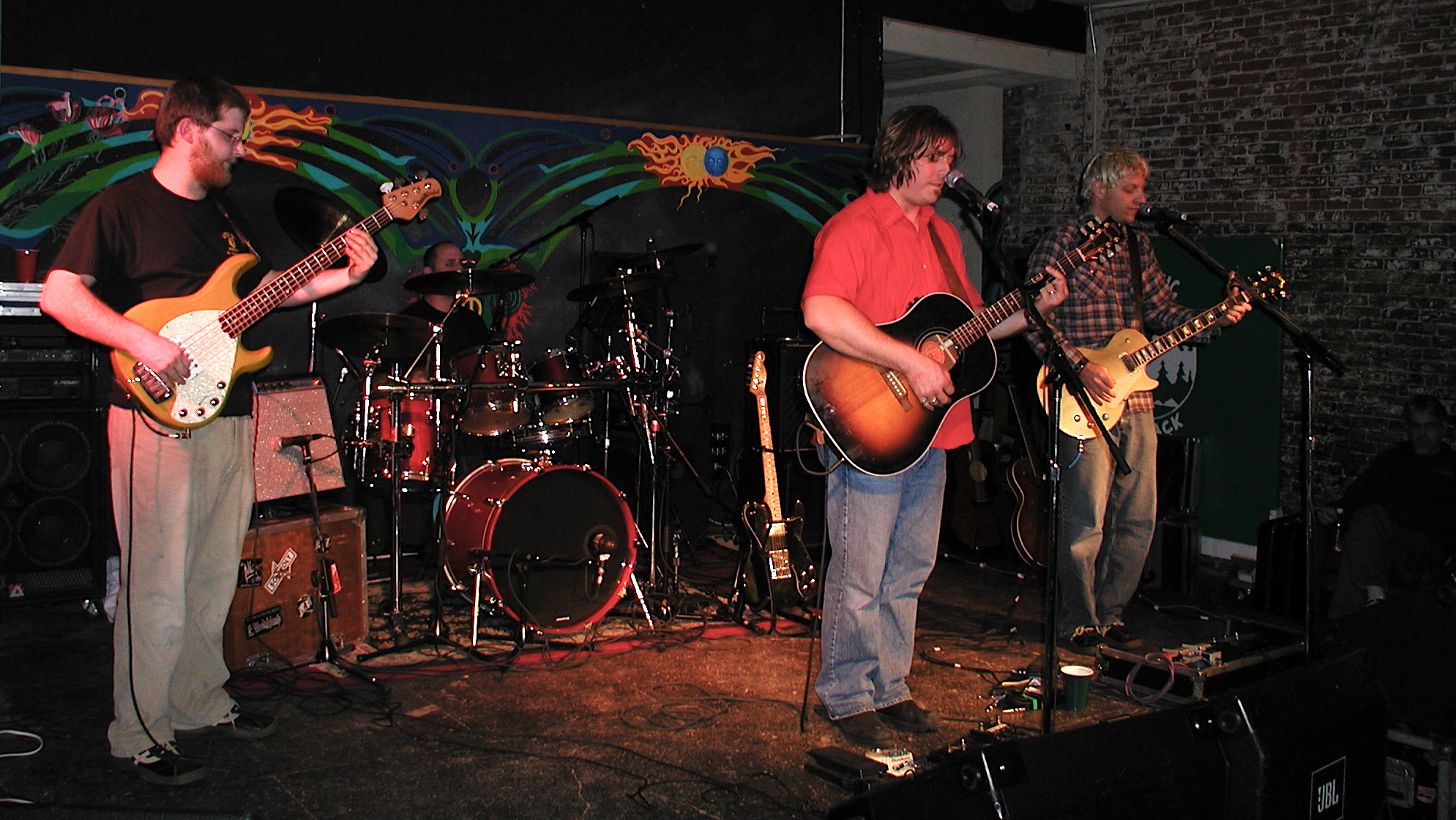
These days, the Milky Way is just a name, a quaint moniker given to the historic building on 21st Avenue officially known as the Propstra Forest Grove Creamery Building.
But for students who came of age in the 1990s and early 2000s, the Milky Way was a huge part of the Pacific experience. It was the place to unwind on a weekend night, enjoy live music or watch the latest Hollywood blockbuster, all just steps from the western edge of campus in downtown Forest Grove.
In the days before cable to the residence halls, streaming and YouTube, the Milky Way was the place to be.
“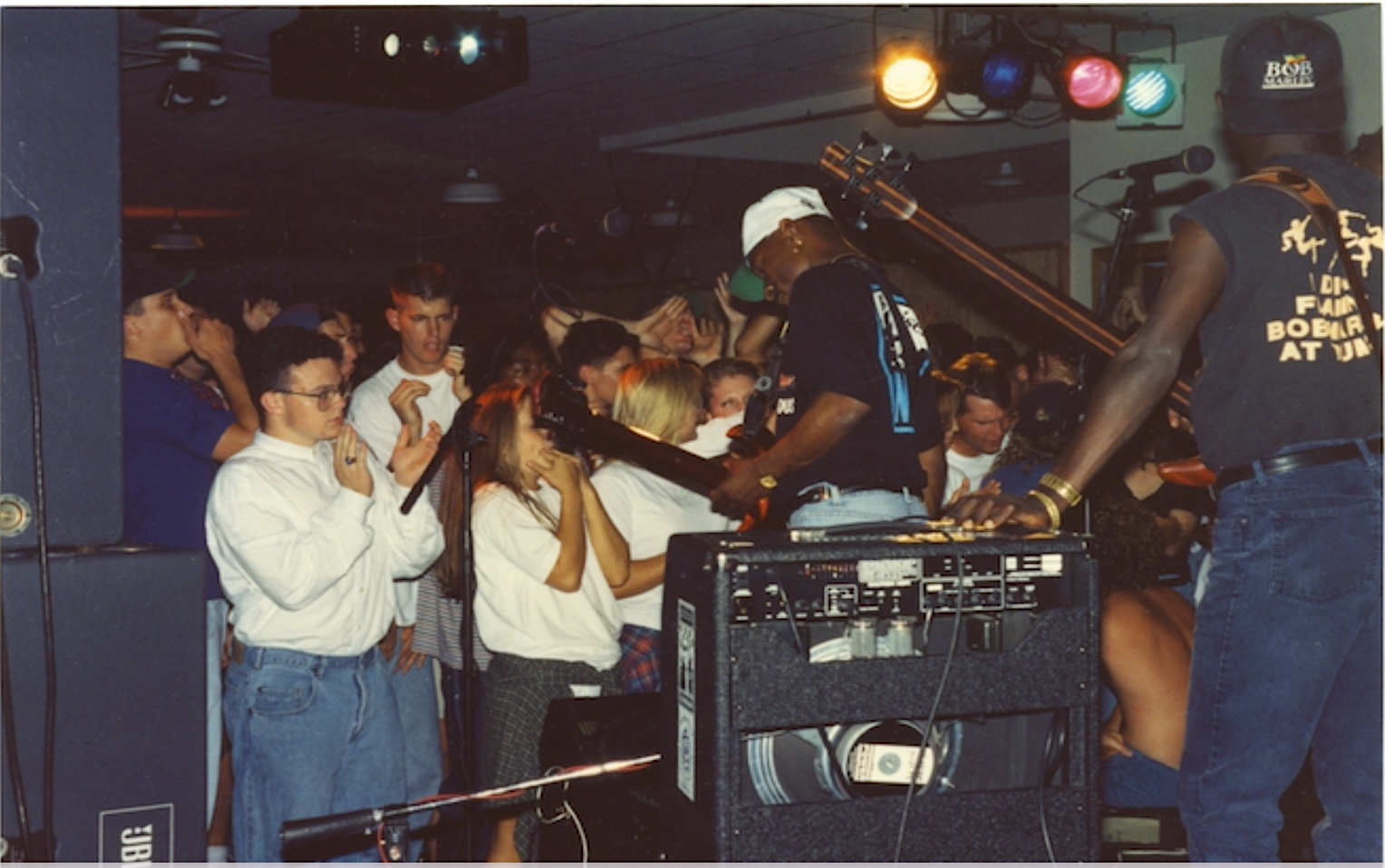 It took a couple of months to establish that this was all happening. And once people came, they kept coming,” said Steve Klein, who developed the Milky Way in 1992 as part of his 38-year career coordinating student activities at Pacific. “For many students, this was where they went for their first live concert. This was their place. This was happening for them. You could see the switch turn on.”
It took a couple of months to establish that this was all happening. And once people came, they kept coming,” said Steve Klein, who developed the Milky Way in 1992 as part of his 38-year career coordinating student activities at Pacific. “For many students, this was where they went for their first live concert. This was their place. This was happening for them. You could see the switch turn on.”
The development of what is also known as the Propstra Forest Grove Creamery Building into the Milky Way was more than a passion for Klein. It was written into his job description when he arrived at Pacific in 1985. Among his charges when he was hired as the university’s activities program coordinator was creating an off-campus night spot for students.
That initially took the form of the “Doghouse” in a space now occupied by part of Diversity Café along Main Street. Despite its small footprint, the Doghouse housed a small stage, a large-screen television and pinball machines. Students shared restrooms with the patrons of Pic-A-Deli Station, which occupied most of the building. It didn’t take long for the Doghouse to be so popular that Klein had to start looking for larger quarters.
At the time, the Creamery Building was occupied by the Hope Food Co-op, a local grocery store that Klein shopped at and helped by organizing a fundraising concert. The co-op folded in the early 1990s and Klein was quick to convince university officials to take over the lease on the space. The name “Milky Way,” a nod to the building’s history, was chosen from a student contest.
The Milky Way officially opened in 1992 with Back Porch Blues, a blues band based out of Portland, the first performing act. The second act to play was the Cherry Poppin Daddies, which hit the Billboard Hot 100 with the single Zoot Suit Riot in 1997. The “Daddies,” a ska-swing band, played Pacific four times, either in the Milky Way or as the featured act on the university’s cruises on the sternwheeler on the Willamette River.
The Milky Way quickly became the place to be on Friday and Saturday nights.
Pacific became a regular stop for local bands of all music tastes. The indie rock crowd enjoyed the sounds of Heatmiser, fronted by Elliott Smith, Kerosene Dream and the Dandy Worhols. Obo Oddy brought his Ghana-inspired drumming to the stage while the Heiruspecs catered to the hip-hop crowd. Jazz cats enjoyed local legends Dan Balmer and Leroy Vinnegar. Craig Carothers and Acoustic Junction gave students a taste of acoustic guitar and roots rock while Railroad Earth strummed bluegrass. (Railroad Earth first played Pacific in 2001 and returned to town in 2023, performing at McMenamins Grand Lodge.)
And it was popular. “We had some bands that just crushed it,” Klein recalled. “There was a band from Chicago we brought in called Les Exodus that was like seeing a Bob Marley concert. He was a reggae man. We had 25 people dancing on the sidewalk because they couldn’t get inside.”
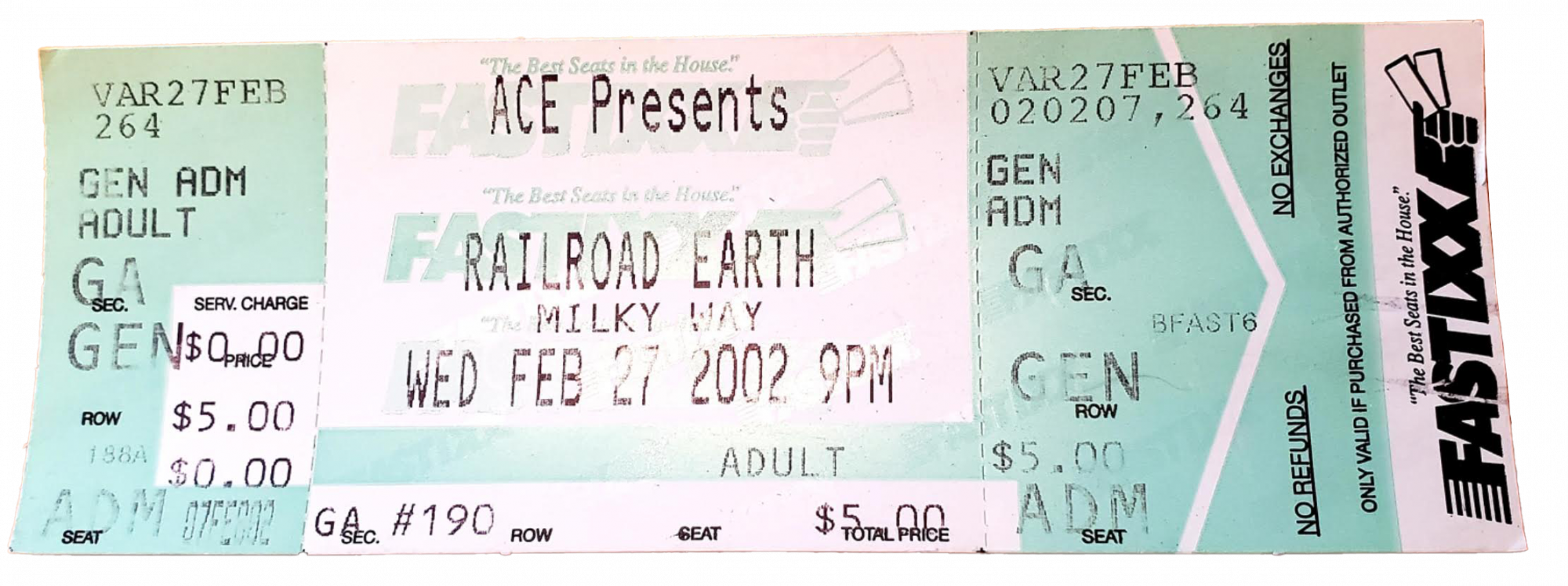 Other acts to make multiple appearances on the Milky Way stage included Golden Delicious (country and bluegrass), Satan’s Pilgrims (rock), Rubberneck (funk), Calobo (roots rock), Amadan (rock) and Dexter Grove (roots rock).
Other acts to make multiple appearances on the Milky Way stage included Golden Delicious (country and bluegrass), Satan’s Pilgrims (rock), Rubberneck (funk), Calobo (roots rock), Amadan (rock) and Dexter Grove (roots rock).
The programming for the Milky Way was a passion for Klein, who retired as Pacific’s director of student activities in 2023. A die-hard music aficionado, he challenged himself to bring in acts that would bring students out.
“I was in Portland all of the time at venues and seeing bands,” Klein said, often taking students with him to help scout talent. “I got to know the sound techs, the promoters, the bookers, so I got into the whole stream. I love music so it played right into my hand.”
Some bands were too big for the Milky Way. One such act was the Crazy 8s, a rock and ska band based in Portland that was singled out by Rolling Stone magazine in 1983 as a “band to watch,” and played alongside some of the 1980s biggest names, including The Clash, Sonic Youth and the Beach Boys. The Crazy 8s played Pacific a record six times.
“They did a big promotion thing in the A&E section of The Oregonian,” Klein recalled. “There’s a picture of them sitting on the steps of Marsh Hall to promote a reunion concert. And they came back and played in 1998. That was one of our last big groups.”
Rubberneck also fit that definition. After first playing to a packed crowd in the Milky Way, subsequent concerts for the group were moved to the University Center to accommodate a larger audience.
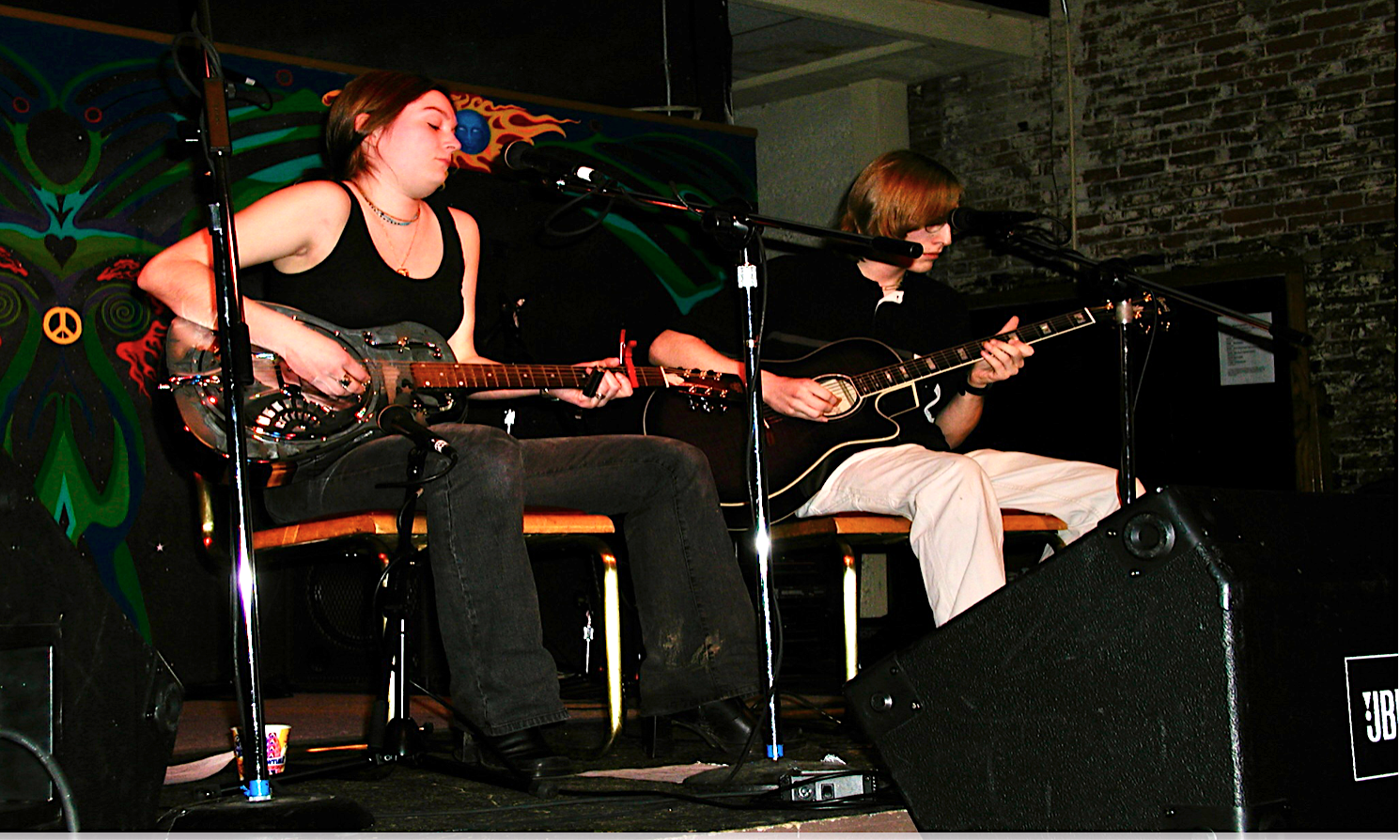 Pacific students also took the stage with a series of “Homegrown” concerts, featuring a wide variety of talent. It was American Idol or America’s Got Talent before it was really a thing.
Pacific students also took the stage with a series of “Homegrown” concerts, featuring a wide variety of talent. It was American Idol or America’s Got Talent before it was really a thing.
“Our students played and they always did quite well,” said Klein, who used the events to help identify what sounds would draw students to concerts. “I spent a lot of time listening. You’ve got to listen to the client, and that is our students. And they can persuade you in different directions.”
While the Milky Way was developed as a concert space, it also served as a multi-purpose venue for the university. The building was used for classes, seminars, university events and trainings for the Pacific Outback program (now Outdoor Pursuits). In the days before streaming, it was the only place to see hit movies without driving to Hillsboro or Beaverton. (The author’s second date with his now wife was to a screening of The Lion King at the Milky Way.)
It was reality television that proved the beginning of the end for the Milky Way. As the popularity of shows like American Idol increased in the early 2000s, Klein noticed attendance at concerts and movies decreasing. The programming was re-tooled to take advantage of what was hot. Shows like “Pacific Idol” and “Pacific’s Got Talent,” judged by faculty and staff, drew large crowds.
At the same time, the Outdoor Pursuits program began to expand. By the 2010s, concerts had moved back onto campus and the outdoor program expanded further into the space.
What would have been recognized as the concert and event venue disappeared for good in 2023 as the building was gutted for a major renovation. The Milky Way name remains but the building is now a magnet space for Outdoor Pursuits and Pacific’s outdoor leadership major following the renovation’s completion.
But memories of the back-lit movie posters against the historic brick wall, the black-painted stage, the smell of espresso from the Cosmic Coffee shop and the rhythm of the bands vibrating through the laminate-wood dance floor remain, an indelible part of the Pacific student experience.
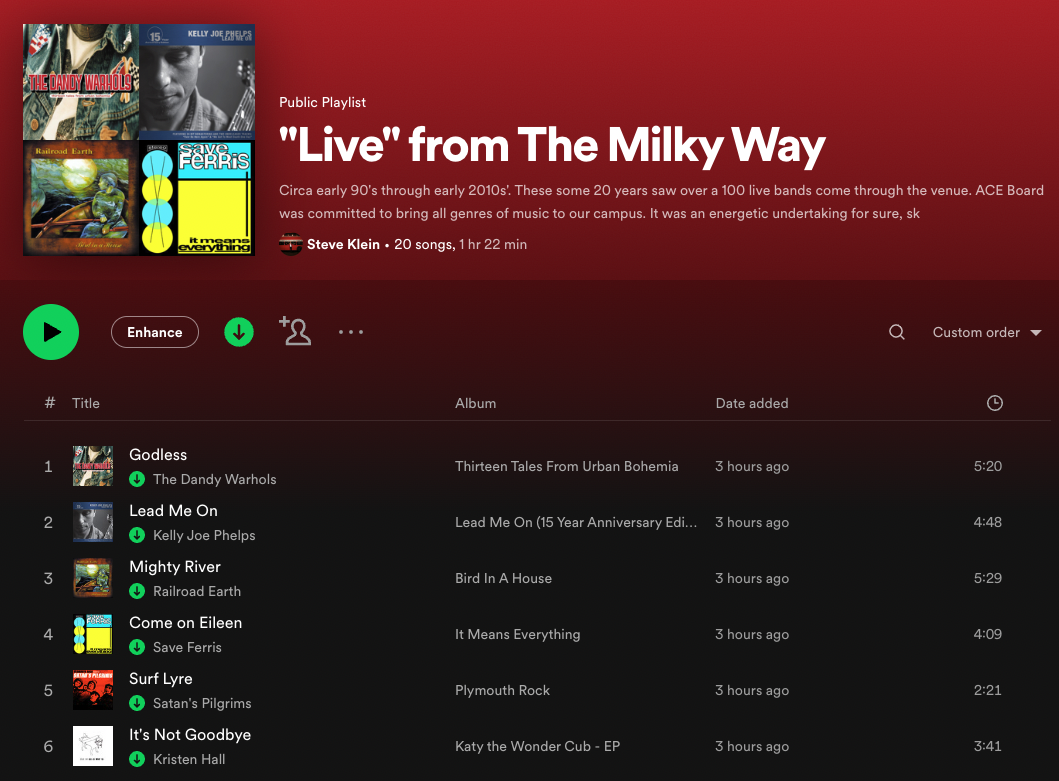 "LIVE" FROM THE MILKY WAY
"LIVE" FROM THE MILKY WAY
Relive some of the groups and sounds that played the Milky Way stage and on campus during Steve Klein's 38 years at Pacific through this Spotify Playlist, curated by Klein himself. With over an hour of music, the playlist includes selections by the Cherry Poppin' Daddies, The Dandy Worhols, Craig Carruthers, Tommy Tutone (yes...that Tommy Tutone) and many more.